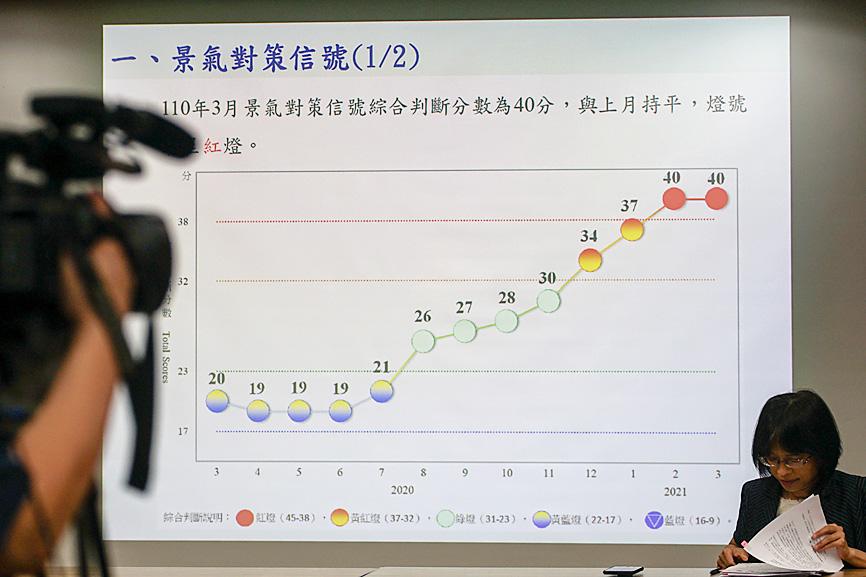The government’s business climate monitor last month was “red” for the second consecutive month, suggesting a boom amid signs that the world is emerging from the COVID-19 pandemic, despite an escalation of infections in India and other countries, the National Development Council said yesterday.
The overall reading was steady at 40, while the nine constituent gauges consolidated at high levels, the council said, adding that the monitor is expected to remain red this quarter, with major economic barometers tipped to be strong.
“Taiwan’s exports still have room to move upward as they move forward with the world on track for recovery from the pandemic,” NDC research director Wu Ming-huei (吳明蕙) told a media briefing.

Photo: CNA
The council uses a five-color system to depict the nation’s economic situation, with “green” indicating steady growth, “red” suggesting a boom and “blue” signaling a recession. Dual colors indicate a transition.
Wu dismissed overheating concerns, as red reflects healthy economic fundamentals, primarily impressive corporate earnings.
That explains why the local bourse has repeatedly reached records this month, Wu said.
All of the measures rose, except non-farm payrolls, Wu said.
The index of leading indicators, which aims to portray the economic situation for the subsequent six months, increased 0.12 percent to 105.35, as readings on imports of semiconductor capital equipment, manufacturing business confidence and labor entry rates rose, the council said.
The leading index has increased for 11 months in a row, with a cumulative gain of 9.15 percent, lending support to the council’s upbeat sentiment, Wu said.
The index of coincident indicators, which reflects the current economic state, increased 0.84 percent to 105.98, while the index has risen 9.18 percent in the past 10 months, the council said.
Industrial output, manufacturing sales, imports of machinery and electrical equipment, as well as wholesale and restaurant revenue, all gained ground, it said.
Exports and domestic demand have bolstered the economy, Wu said.

Sweeping policy changes under US Secretary of Health and Human Services Robert F. Kennedy Jr are having a chilling effect on vaccine makers as anti-vaccine rhetoric has turned into concrete changes in inoculation schedules and recommendations, investors and executives said. The administration of US President Donald Trump has in the past year upended vaccine recommendations, with the country last month ending its longstanding guidance that all children receive inoculations against flu, hepatitis A and other diseases. The unprecedented changes have led to diminished vaccine usage, hurt the investment case for some biotechs, and created a drag that would likely dent revenues and

Macronix International Co (旺宏), the world’s biggest NOR flash memory supplier, yesterday said it would spend NT$22 billion (US$699.1 million) on capacity expansion this year to increase its production of mid-to-low-density memory chips as the world’s major memorychip suppliers are phasing out the market. The company said its planned capital expenditures are about 11 times higher than the NT$1.8 billion it spent on new facilities and equipment last year. A majority of this year’s outlay would be allocated to step up capacity of multi-level cell (MLC) NAND flash memory chips, which are used in embedded multimedia cards (eMMC), a managed

CULPRITS: Factors that affected the slip included falling global crude oil prices, wait-and-see consumer attitudes due to US tariffs and a different Lunar New Year holiday schedule Taiwan’s retail sales ended a nine-year growth streak last year, slipping 0.2 percent from a year earlier as uncertainty over US tariff policies affected demand for durable goods, data released on Friday by the Ministry of Economic Affairs showed. Last year’s retail sales totaled NT$4.84 trillion (US$153.27 billion), down about NT$9.5 billion, or 0.2 percent, from 2024. Despite the decline, the figure was still the second-highest annual sales total on record. Ministry statistics department deputy head Chen Yu-fang (陳玉芳) said sales of cars, motorcycles and related products, which accounted for 17.4 percent of total retail rales last year, fell NT$68.1 billion, or

In the wake of strong global demand for AI applications, Taiwan’s export-oriented economy accelerated with the composite index of economic indicators flashing the first “red” light in December for one year, indicating the economy is in booming mode, the National Development Council (NDC) said yesterday. Moreover, the index of leading indicators, which gauges the potential state of the economy over the next six months, also moved higher in December amid growing optimism over the outlook, the NDC said. In December, the index of economic indicators rose one point from a month earlier to 38, at the lower end of the “red” light.